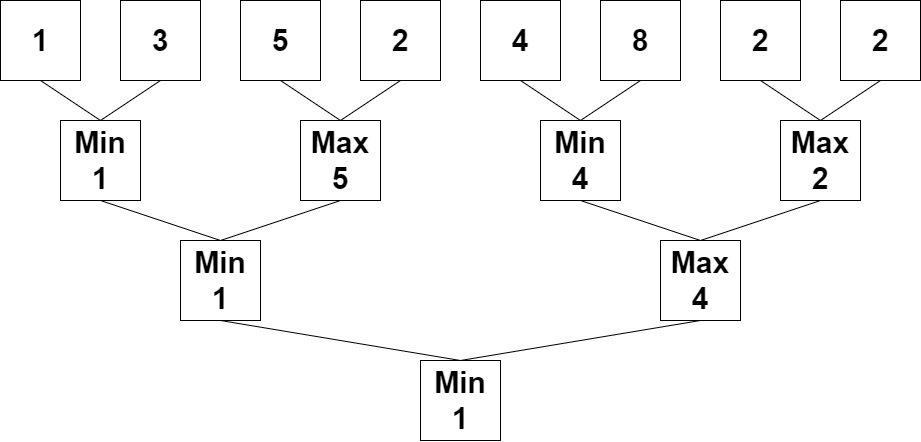LeetCode-in-Java
2293. Min Max Game
Easy
You are given a 0-indexed integer array nums whose length is a power of 2.
Apply the following algorithm on nums:
- Let
nbe the length ofnums. Ifn == 1, end the process. Otherwise, create a new 0-indexed integer arraynewNumsof lengthn / 2. - For every even index
iwhere0 <= i < n / 2, assign the value ofnewNums[i]asmin(nums[2 * i], nums[2 * i + 1]). - For every odd index
iwhere0 <= i < n / 2, assign the value ofnewNums[i]asmax(nums[2 * i], nums[2 * i + 1]). - Replace the array
numswithnewNums. - Repeat the entire process starting from step 1.
Return the last number that remains in nums after applying the algorithm.
Example 1:

Input: nums = [1,3,5,2,4,8,2,2]
Output: 1
Explanation: The following arrays are the results of applying the algorithm repeatedly.
First: nums = [1,5,4,2]
Second: nums = [1,4]
Third: nums = [1]
1 is the last remaining number, so we return 1.
Example 2:
Input: nums = [3]
Output: 3
Explanation: 3 is already the last remaining number, so we return 3.
Constraints:
1 <= nums.length <= 10241 <= nums[i] <= 109nums.lengthis a power of2.
Solution
public class Solution {
public int minMaxGame(int[] nums) {
int n = nums.length;
if (n == 1) {
return nums[0];
}
int[] newNums = new int[n / 2];
for (int i = 0; i < n / 2; i++) {
if (i % 2 == 0) {
newNums[i] = Math.min(nums[2 * i], nums[2 * i + 1]);
} else {
newNums[i] = Math.max(nums[2 * i], nums[2 * i + 1]);
}
}
return minMaxGame(newNums);
}
}

